- Home
- Claudia Mills
Write This Down Page 4
Write This Down Read online
Page 4
“You know,” Dad says, “when I was in middle school, I was close to failing math. But I decided that it wasn’t my math aptitude that was the problem; it was my math attitude. Let me tell you, it made a world of difference. By the time I got to high school, I was sailing along. I even joined the math team.”
“And now you’re Broomville’s best orthodontist seven years in a row.” Hunter sneers, as if being an orthodontist is some kind of joke. “Wow, Dad. Talk about coming a long way.”
The muscles tense in Dad’s jaw, and Mom lays her hand on his arm, as if to warn him not to say what he might say next. Not that Dad ever says anything terrible to either one of us, but sometimes I can look at him, look at both of our parents, and know what they’re thinking. And thinking can be even worse than saying.
My brother must know this, too, because he lays down his fork and stalks out of the room, leaving most of his healthy-Asian-kitchen meal uneaten on his plate.
7
I’m the one who sees the sign on the display board in front of the Broomville Humane Society. We’re in the car: Mom is driving Kylee and me to our Thursday-afternoon ballet class.
I’m not very good at ballet, but Dad says I have to do a sport, and I got him to agree that ballet is athletic enough to count. Even though Dad tried to make Hunter do a sport, too, Hunter didn’t do any extracurricular activities his freshman year, as in none at all. Dad made this big speech last summer about how what you do after school is just as important for getting into a good college as how you do during school, so this year Hunter signed up for cross-country, which doesn’t require competitive tryouts like football (Dad’s favorite sport) or soccer or tennis. But Hunter quit after the first week of practice, which started in August the week before school began; in fairness to Hunter, it was the hottest August ever recorded in Broomville. Dad, who usually rolls with life’s punches pretty well, stalked out of the room when Hunter broke the news to him, just like Hunter stalked out of the room on the healthy-Asian-dinner night.
Kylee isn’t very good at ballet either, and her parents don’t care about sports, but they said she has to do something besides knit all the time.
So twice a week, on Mondays and Thursdays, Kylee and I go together to this funky, run-down dance studio on the other side of town from the Dr. Jaws office. We have to pass the Humane Society building on the way there, and they have this sign in front that says things like ADOPTION SPECIAL THIS WEEK! or (on the week Hunter quit the cross-country team) DON’T LEAVE PETS IN A HOT CAR!
“Mom, stop!” I call from the backseat, where Kylee is sitting next to me.
Mom slams on the brakes, which is not what I meant for her to do, especially with a huge SUV right behind us.
I guess I should have made myself more clear.
Thankfully, she manages to pull over to the side of the road. Wouldn’t it have been ironic if I survived Hunter’s driving only to get myself killed in a rear-end collision with my safety-obsessed mother at the wheel?
“Autumn, don’t shout things like that while I’m driving!” Mom scolds.
“I’m sorry,” I say in a small voice because I really truly am. “I wanted Kylee to see the sign on the animal shelter.”
Kylee reads it aloud: “KNIT FOR DOGS! DETAILS INSIDE!”
I expect Kylee’s face to light up with excitement. The only thing Kylee loves as much as knitting is animals. Her parents won’t let her get a pet—her mom’s allergic—so this could be next best.
But she wrinkles her little button nose. I like Kylee’s nose so much better than mine. Hers is cute. Mine is more what you’d call regal, which really means big and pointy-ish.
“Remember that penguin-knitting thing you found for me?” she asks. “Where I was supposed to knit sweaters for penguins who were injured in that oil spill in Australia or somewhere? You showed me pictures of penguins dressed up in sweaters, and so I knitted three whole penguin sweaters, and then we found out that penguins hate wearing sweaters, and being made to wear a sweater stresses already stressed-out, oil-soaked penguins even more?”
Okay, so knitting penguin sweaters had been a bad idea.
Even if the picture of the penguins in their sweaters had been quite possibly the most adorable picture in the history of the world.
“We should go in and get the details at least,” I say. “Mom, can we? You know we’re always super early for ballet.”
“Kylee?” Mom asks.
Kylee shrugs. “Okay.” But she crinkles her forehead in a skeptical way.
The lady at the front desk is knitting when we walk in. A good sign!
Margo—that’s what it says on her name badge—explains that the warmth and snugness of a sweater is comforting for dogs who have been abandoned to an animal shelter. She says the shelter believes in taking their dogs out on exercise walks in all kinds of weather, and sweaters will be needed with cold weather on the way. She says the dogs can take their sweaters with them to their new homes when they’re adopted, and the familiarity of the sweater helps ease the transition.
It makes perfect sense to me.
“Are all of you knitters?” Margo asks.
“Just Kylee,” I say. “But Kylee is a totally amazing knitter.”
“So what do you think, Kylee?” Margo asks. “We have a variety of patterns I can give you, sized for small, medium, and large dogs. And we have yarn donated by local merchants.”
At that very moment, a shelter volunteer comes through the front door with three small dogs on leashes. The dogs are wearing hand-knit sweaters.
Kylee gives a big, deep, rapturous sigh. I sigh with relief at hearing her sigh.
Three minutes later she is clutching a folder of photocopied dog sweater patterns in one hand and a shopping bag filled with skeins of brightly colored yarn in the other.
“Girls, we’re going to be late for ballet,” Mom says, but she, too, seems dazzled by the adorableness of the dogs in their sweaters. Knowing my mother, now she’ll try to teach herself to knit from some YouTube video—maybe we’d be a happy family if we all had matching hand-knit sweaters—only to give up on it a couple of weeks later. During which time, my best friend will have knitted sweaters for every dog in the Broomville animal shelter.
“See?” I say to Kylee after we’ve dashed back to the car. (Madame Fidelio’s nostrils flare in this awful angry way if anyone isn’t standing at the barre at exactly four o’clock on the dot.) “Do I have good ideas or what?”
Seat belt buckled, Kylee reaches over and squeezes my hand. Already she’s studying the first pattern in the folder. The photograph shows a poodle wearing a sweater with blue and yellow zigzag stripes.
“Some of your ideas are better than others,” Kylee says. “But this idea is going to be great.”
8
Cameron didn’t notice my existence in class on Tuesday, Wednesday, or Thursday. I felt so horrible after Hunter said that Cameron thinks my poetry sucks that I pretended he didn’t exist, too. But now it’s Friday, and one way or another I have to find out where I stand with him, both as a poet and as a girl who is in love with him.
I still haven’t heard from The New Yorker, even though I check my phone constantly just in case. I wonder if Ms. Archer ever sent any of her poems there. I’d love to ask her, but it’s hard to find time to talk to her before or after class given that we have a four-minute passing period. While we sometimes get an opportunity to conference with her during class, that hasn’t happened this week. Besides, I hate the thought that Olivia might overhear my talking to her about trying to get my poems published. If Olivia heard me ask that, she’d probably rush hers off to The New Yorker, too. And the last thing I’d want is for Cameron to know that I’m trying to publish my poems about him. I don’t want him to know anything until I have the poem there, in print, proof that my poems aren’t sucky, and are in fact the total opposite of sucky.
Before class, I say “Hey” to Cameron, who as usual is there in his seat before I get to the room; he comes
from first-period language arts, right next door.
To say that one word I have to screw my courage to the sticking place, as Shakespeare said. We did a couple of scenes from Shakespeare plays in the drama camp Kylee and I signed up for this past summer, which is where I learned how bad an actress she is. I may be a better actress than Kylee is, but not good enough to say “Hey” to Cameron without feeling my cheeks flame.
“Hey,” he says back, though maybe it’s more of a cross between a word and a grunt.
“What are you going to write your personal essay about?” I blurt out.
He shrugs. It doesn’t seem to be a rude shrug, more of an I-don’t-know-yet shrug.
“You?” he asks then.
Now this is turning into an actual conversation, the kind where both people talk.
“I don’t know either,” I say. “I think I might write something about my br—”
How could I be such a babbling idiot? I had planned to take my Mrs. Whistlepuff freewrite and turn it into a full-fledged essay. But the last thing I want to talk about with Cameron is brothers, especially brothers who tease younger sisters about certain poems written about certain boys.
“Your brother.” Cameron finishes the word for me, not that it’s hard to figure out what word starts with “br.”
I feel my ears reddening to match my already red cheeks.
“Hunter,” Cameron says, as if to confirm which brother I’m talking about. “You have my condolences.”
Another thing that makes Cameron seem different from the rest of us is that even in ordinary conversation he uses words most kids don’t use. “You have my condolences” means that Cameron is expressing sympathy toward me for having Hunter as a brother. What it really seems to mean is that Cameron thinks Hunter is a jerk.
Why does he think Hunter is a jerk? Is Hunter a jerk because of reading my poem to the band? After all, Cameron’s brother was the one who told Hunter to give my notebook back to me. So does Cameron think Hunter was mean then, too? Mean because my poem was so embarrassingly bad nobody should ever read it aloud to anyone else? Or mean because my poem was so amazingly good that nobody should ever make fun of it?
I’ve come to another sticking place where I need to screw more courage and force out one more syllable.
“Why?” I ask.
Cameron gives me a smile that can only be described as inscrutable, which means “impossible to understand or interpret.”
“You know why,” he says.
He smiles again, and this time it’s not a mocking smile, exactly, but sort of an amused smile. Like the smile of a boy who knows that the girl sitting next to him wrote him a love poem. I can’t tell if the smile means that he thought the love poem was good or bad. There’s a limit to what you can decipher from one single smile.
Now my face must be redder than red. It’s aubergine: the deep, black-purple of an eggplant.
I still don’t know what Cameron thought about my poem, but that he thinks my brother is awful for making fun of it suggests that Cameron gets it, that he’s on my side. Maybe in a romantic, protective kind of way?
Kylee slips into her seat, nearly tardy as always. Olivia turns around to glare at Kylee for grazing her shoulder as she dashed past.
I try to think of something else to say. “Hunter didn’t use to be like this.”
Cameron cocks his eyebrow—like, Yeah, right, but also like he’s interested in hearing more, as in interested in my brother, and so, according to the principle of transitivity we learned about in pre-algebra, interested in me.
“So what happened?” Cameron asks.
I’m about to say, I think he might have changed when he joined the band. Maybe Cameron would say that his brother changed when he joined the band, too. Maybe there’s something about being in a rock band that makes older brothers start acting mean to their younger siblings. But Cameron offered me condolences about having Hunter as a brother in a way that made it sound as if my brother was a lot worse than his, if his is even bad at all.
But just then Ms. Archer calls the class to order: “Good morning, intrepid scholars.” That’s what she calls us sometimes, which could come off as sounding sarcastic but doesn’t when she says it. “Intrepid” means bold and fearless, exactly what I want to be as a writer.
Now that class is beginning, I couldn’t answer Cameron’s question even if I knew the answer, which I don’t. The band thing was only a guess, and maybe not a good one at that.
I wish I did know.
If I knew what happened to make Hunter change, maybe I’d know what to say or do to make him change back again.
9
On Saturday morning—well, what’s left of Saturday morning (the clock on the microwave reads 11:40)—I’m in the kitchen, chatting with Mom at the table, and Hunter has just staggered downstairs—bare-chested, pj bottoms, hair looking like he mussed it on purpose to look more like a wannabe rock star, which maybe he did.
I’ve been up since seven-thirty. Mom says it’s bad for your circadian rhythms—that’s what she calls them—to sleep more than an hour later on the weekends than you do during the week. I’m a morning person anyway, so I’ve already showered, made French toast for me and our parents (it’s the only thing I can cook, but it’s delicious), knocked off a pre-algebra problem set, worked on my personal essay about Hunter, and helped Dad rake leaves.
Okay, I admit it, I’m feeling smug, and even smugger now that Hunter has appeared half-asleep with nothing to show for his Saturday morning. Like the “Goofus and Gallant” comics I still read for old times’ sake in the Highlights magazines at Dad’s office. Goofus always does the bad thing, like leaving his dirty dishes on the table, and Gallant always does the good thing, like carrying his dirty dishes to the sink. The comic has the least subtle moral of anything in the world, but maybe I like it for that reason. With “Goofus and Gallant,” you always know exactly how you’re supposed to be.
Be like Gallant.
Don’t be like Goofus.
In my house, though our parents would never come right out and say this, I’m clearly the family’s Gallant and Hunter is the family’s Goofus.
Be like Autumn.
Don’t be like Hunter.
Even back in the Mrs. Whistlepuff days, I remember how Mom’s forehead would furrow when Hunter would bring home his Friday folder and she’d see work that was unfinished or sloppy, with comments like “Hunter needs to check his work more carefully,” “Hunter needs to learn to follow rules,” and “Hunter needs to stay on task.”
Our parents, being our parents, had him tested. But I never heard anybody say he has attention-deficit disorder (ADD) or any other official thing that has a bunch of initials ending in a “D.” He was just the kind of kid who couldn’t sit still, who had to be drumming on the table or sassing a teacher because he thought up something super funny to say. I know our parents hoped that he’d “grow out of it.” I heard Mom tell Dad once that Hunter was a “late bloomer,” as if that was a fine thing to be. Daffodils bloom in the spring. Chrysanthemums bloom in the fall. It’s not a bad thing to be a chrysanthemum.
I know they had hoped the blooming would start by the time he got to high school, but I didn’t notice a whole lot of blooming going on last year. And this year—well, this year so far is a hundred times worse.
Because here’s the thing about Hunter: however bad his Friday folder was, however worried Mom looked on parent-teacher-conference night, he was always nice to us. He had this great grin he’d flash after Mom or Dad yelled at him, a grin that was like, Say whatever you want, but I know you love me anyway.
That’s what’s different now.
Without even a flicker of acknowledgment, Hunter opens the fridge, grabs the carton of orange juice, and takes a swig.
“Hunter,” Mom says, the scolding tone on automatic pilot, without any real energy in it.
“What?” Hunter asks, as if she hasn’t told him ten thousand times to use a glass.
I see Mom�
��s eyes roam over to the microwave clock. “You didn’t use to sleep till noon. What’s going on? I heard you come in at eleven”—that’s Hunter’s curfew on weekends, which is plenty late if you ask me—“so I know you weren’t out until all hours. Did you stay up late on the computer?”
Hunter puts a piece of bread in the toaster, which surprises me. He isn’t usually willing to go to that much trouble. Given the hour, maybe the piece of toast is his brunch.
“Hunter, I’m talking to you.”
As if he could think she was talking to me.
“Are you having trouble sleeping?” Her tone is softer now.
I know she wishes that Hunter’s new awfulness—what she likes to call his moodiness—has a simple biological explanation. It’s not that Hunter has turned nasty and mean; it’s that he’s sleep-deprived, poor thing. Sometimes I’ve heard her say “Hormones” to Dad when Hunter slams a door. She says the same thing when I get extra crabby, or tear up over a B− on a paper for multicultural history. (Mr. Morton loves to give even his top students little “wake-up calls” when he thinks we’re not doing our best work.)
Hunter still makes no reply.
His toast pops up.
Without even buttering it, not to mention putting it on an actual plate, he starts to walk back upstairs, toast in hand.
“Hunter James Granger!”
Don’t parents know how clichéd it is to call your kids by all three names when you’re extra irritated with them?
Hunter does turn around, his mouth conveniently full of toast. So maybe the three-name thing survives as part of the parenting script because it works.
“Hunter,” Mom says tentatively. “Do any of the guys in the band use drugs? I know that musicians, well, sometimes they walk on the wild side … and the other band members, they’re older—”
Hunter bursts out laughing. The crumbs of toast spraying out of his mouth do nothing to make his shirtless, mussed-hair, vacant-eyed look any more attractive.

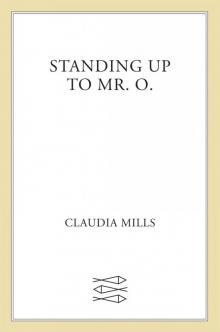 Standing Up to Mr. O.
Standing Up to Mr. O.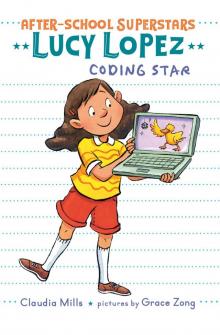 Lucy Lopez
Lucy Lopez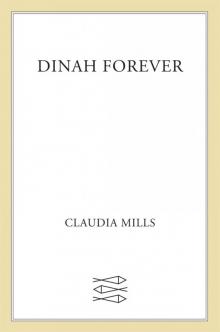 Dinah Forever
Dinah Forever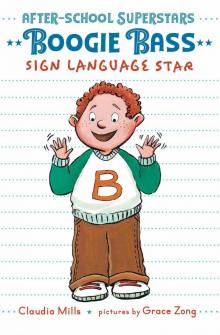 Boogie Bass, Sign Language Star
Boogie Bass, Sign Language Star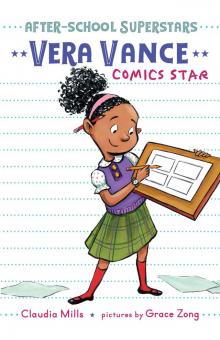 Vera Vance: Comics Star
Vera Vance: Comics Star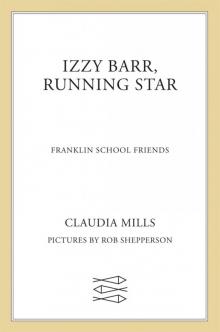 Izzy Barr, Running Star
Izzy Barr, Running Star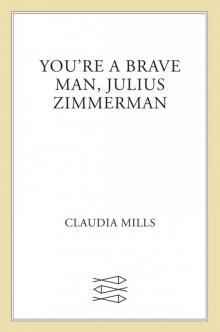 You're a Brave Man, Julius Zimmerman
You're a Brave Man, Julius Zimmerman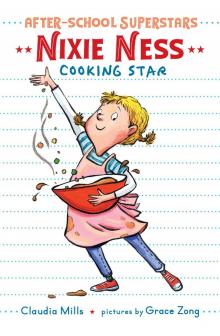 Nixie Ness
Nixie Ness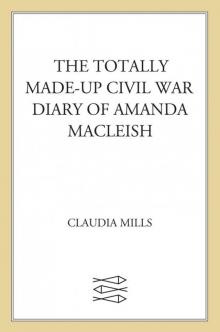 The Totally Made-up Civil War Diary of Amanda MacLeish
The Totally Made-up Civil War Diary of Amanda MacLeish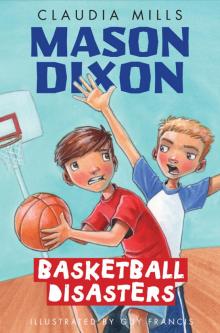 Basketball Disasters
Basketball Disasters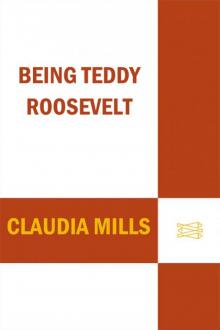 Being Teddy Roosevelt
Being Teddy Roosevelt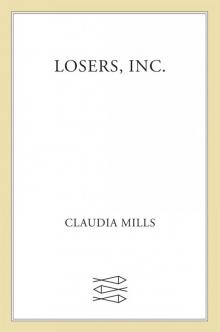 Losers, Inc.
Losers, Inc.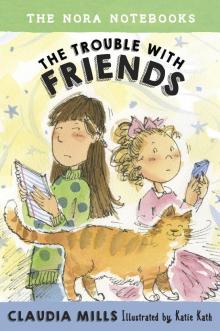 The Trouble with Friends
The Trouble with Friends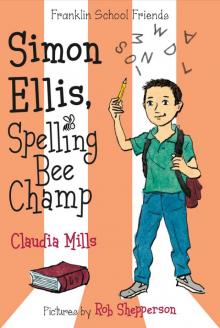 Simon Ellis, Spelling Bee Champ
Simon Ellis, Spelling Bee Champ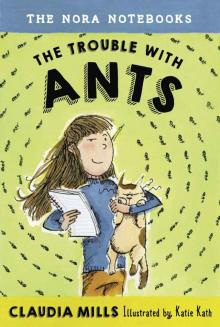 The Nora Notebooks, Book 1: The Trouble with Ants
The Nora Notebooks, Book 1: The Trouble with Ants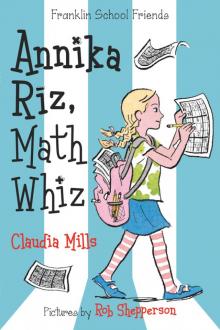 Annika Riz, Math Whiz
Annika Riz, Math Whiz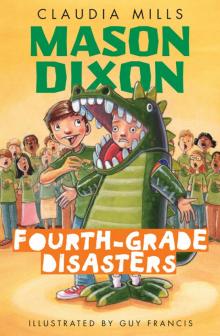 Fourth-Grade Disasters
Fourth-Grade Disasters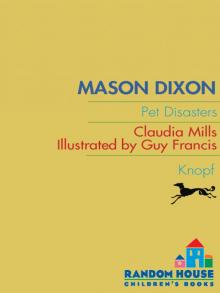 Pet Disasters
Pet Disasters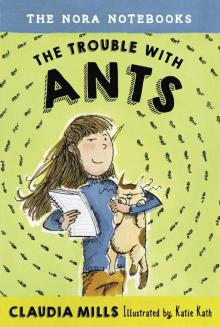 The Trouble with Ants
The Trouble with Ants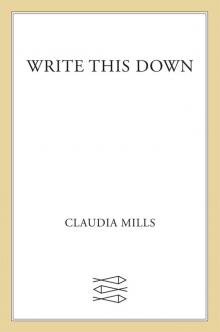 Write This Down
Write This Down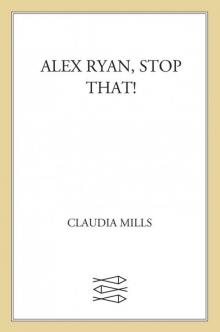 Alex Ryan, Stop That!
Alex Ryan, Stop That!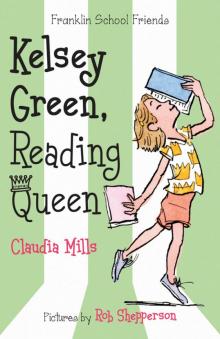 Kelsey Green, Reading Queen
Kelsey Green, Reading Queen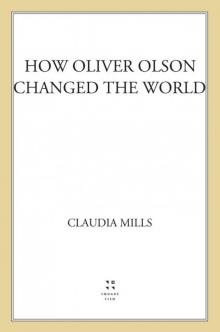 How Oliver Olson Changed the World
How Oliver Olson Changed the World Lizzie At Last
Lizzie At Last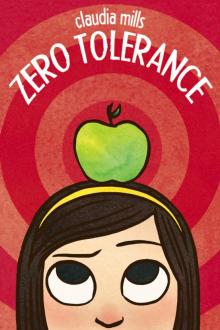 Zero Tolerance
Zero Tolerance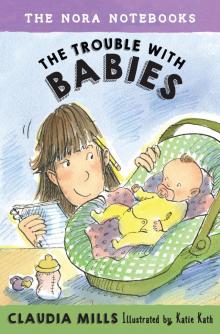 The Nora Notebooks, Book 2
The Nora Notebooks, Book 2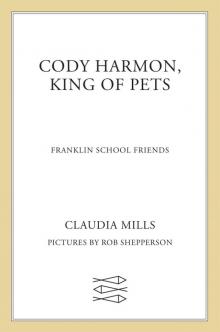 Cody Harmon, King of Pets
Cody Harmon, King of Pets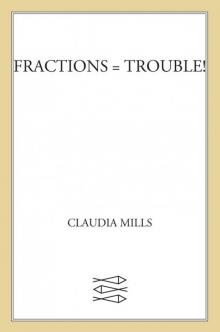 Fractions = Trouble!
Fractions = Trouble! Makeovers by Marcia
Makeovers by Marcia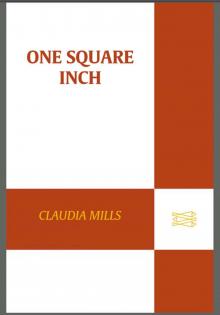 One Square Inch
One Square Inch